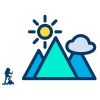Safety
- Small-scale bomb attacks are common in Nepal, particularly in Kathmandu. There were a series of small-scale explosions in Nepal between December 2020 and March 2021. Several devices have lately been discovered in Nepal. Attacks spike at times of political unrest, such as elections. Local government elections will be held on May 13, 2022.
- Political demonstrations and general strikes occur on occasion. Strikes have the potential to disrupt critical services. Ensure you have extra water, food, batteries, cash, and medication during a strike. During times of political instability, avoid visiting government buildings. Consider whether running a vehicle during strikes is necessary because it may be a target. Participating in public protests will violate your visa requirements, and you will be arrested and deported.
- Petty thievery and pickpocketing are widespread. Bag snatching and snatch-and-grab attacks on motorcyclists are common. Keep your stuff close at hand. Females are more likely to be assaulted when travelling alone.
- Travellers have been victims of armed robberies and assaults; armed robberies and assaults, including sexual assaults, have occurred against travellers. Drink spiking frequently occurs before a sexual assault. Strangers should never be given food, drinks, gum, or cigarettes. Leave your food and drinks unattended.
- Earthquakes, landslides, floods, and severe weather are common in Nepal. Prepare for a huge disaster. Maintain an emergency kit with first-aid materials and bottled water.
Health
- COVID-19 is still a severe threat in Nepal.
- Above 2,500 meters, altitude sickness is a possibility. It is potentially fatal. It can affect anyone, including physically fit people. Check that your trip insurance includes altitude medical evacuation. Seasonal smog and pollution are prevalent in some cities, including Kathmandu. If you are having trouble breathing, seek medical attention.
- Malaria is a risk in the Terai (plains), Hill, and Chitwan National Park. Consider using an anti-malarial medication in these places. Can find Other mosquito-borne diseases in Kathmandu. Dengue fever and Japanese encephalitis are two examples. Make sure your lodging is insect-proof. Before you travel, get vaccinated against Japanese encephalitis.
- Rabies is widespread. It is lethal if not treated immediately. Should avoid Dogs, monkeys, and other mammals. If an animal bites or scratches you, get medical attention directly.
- HIV/AIDS is very frequent. Take precautions to reduce your exposure to the virus. Waterborne, foodborne, parasitic, and other infectious disorders are all prevalent. Typhoid, cholera, and hepatitis are among them. Only drink boiled or bottled water. Avoid eating raw or undercooked foods.
- Medical facilities in Nepal are pretty inadequate, particularly outside of Kathmandu. Treatment at high-quality facilities in Kathmandu is pricey. If you are critically ill or injured, you will require medical evacuation. Check to see if your travel insurance covers this.
Local laws
- Do not use or transport illegal drugs. In tourist locations, you may be given illegal narcotics. The penalties for drug offences are high, even if the amount is tiny.
- When taking photographs, exercise caution. Photographing army facilities, checkpoints, and military personnel is prohibited.
- Participating in public protests will violate your visa requirements, and you will be arrested and deported.
- Converting someone from their religion is unlawful. Punishment may include incarceration. If you are accused of attempting to convert others, you will undoubtedly be deported and barred from returning to Nepal.
- Same-gender relationships are legal. But society is conservative. Travellers who identify as LGBTI have reported harassment and discrimination. Keep public demonstrations of affection to a minimum.
- Nepal does not recognize dual citizenship. Always travel with a valid passport.
Travel
- Nepal has lifted the majority of COVID-19 restrictions. To access some hotels, restaurants, stores, and tourist attractions, you may be required to wear face masks, sanitize your hands, and keep a social distance. Some places may require you to produce a vaccination certificate.
- Nepal provides trekking and mountaineering permits, but you should check with your trip company about operations in the spring and autumn seasons of 2022.
- The Nepalese Rupee is the local currency (NPR). Banks and exchange offices in large cities will exchange foreign currency for NPR. Major hotels and shopping malls accept credit cards. In rural locations, ATMs are uncommon. Carry enough money to pay your expenses.
- Use only registered taxis and licensed limousines. Taxi drivers frequently refuse to use meters and thus overcharge passengers. Before you leave, haggle over the fare with the driver. Avoid taking public buses or vans. They’re overcrowded and in disrepair. Intercity buses are frequently involved in serious accidents. On public transportation, women may face harassment.
- For regular updates, follow Tripura Travelcations on Facebook and Instagram. Follow the advice of local authorities if you want to stay in Nepal for a lengthy period to reduce your chance of exposure to COVID-19.



Comment (0)